PAGES from The Prophet: The Coming of The Ship
Embracing dualities, what lies within us as human beings, and a way to navigate through life.
I am the type who appreciates honesty, so let me be honest with you:
I’m no Gibran expert.
I haven’t read his entire collection of work and I know less about his life than I dare admit. I am, however, obsessed with this particular copy of The Prophet.
This little book holds two inscriptions on its cover pages: one from the earliest student teachers to assist my great-Grandmother in her Latin and English primary education courses, the other from my great-Grandmother, Nanny, gifting it to me. She calls it “a treasure” — I believe she’s right.
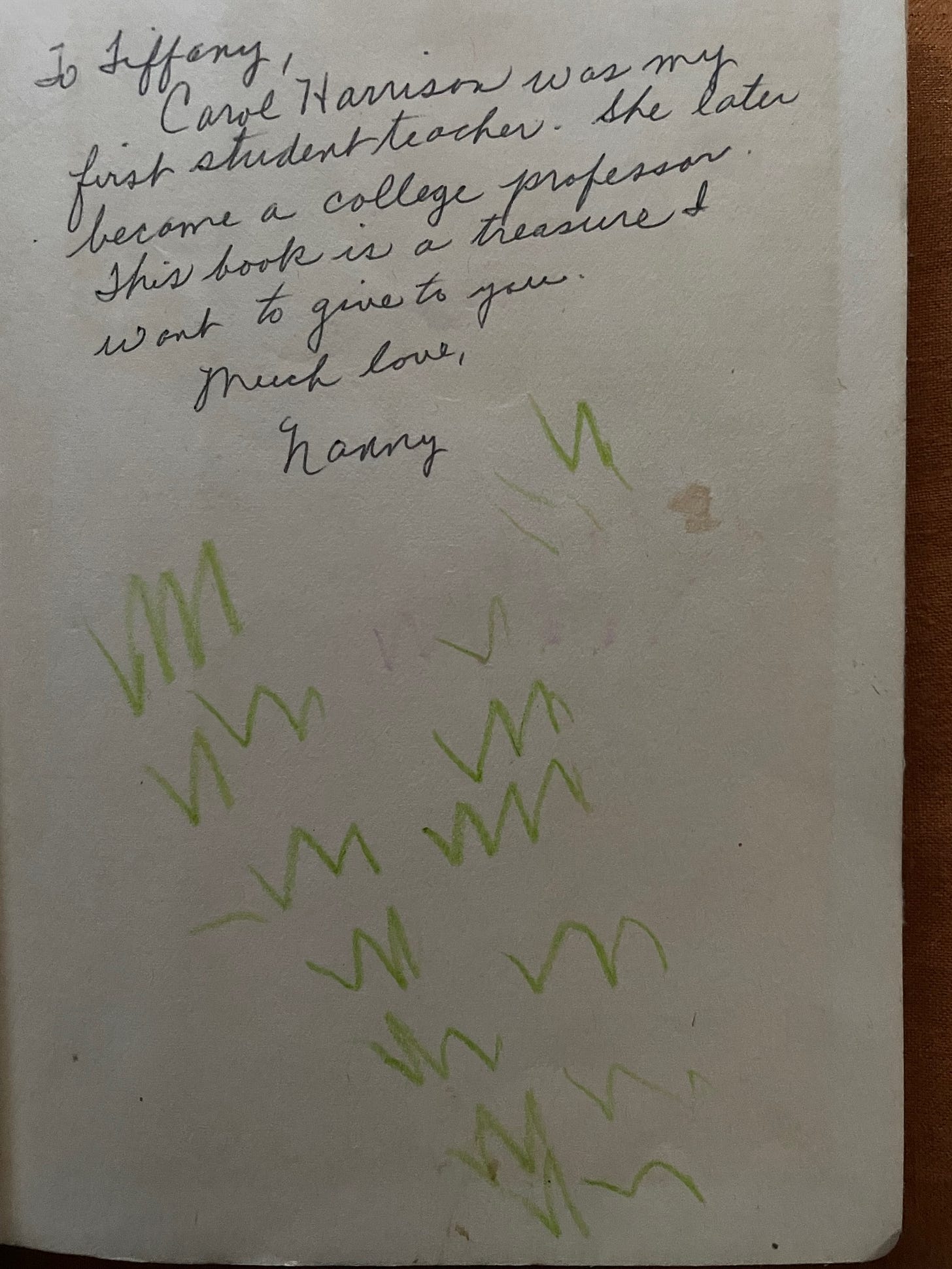
Had I only known how right she was when I inherited it from her; though I was beginning to age out of childhood, I had no idea what it meant to hold pride in one’s self as a lover, friend, fighter. I could neither understand the depths from which The Prophet speaks, nor see the expansive heights of his spoken words.
My Nanny, our Great Depression era matriarch, has long since passed but her slanted, sharp cursive greets me each time I turn to The Prophet (which is often). I seek these yellowing pages when my heart yearns for peace, or my mind hungers for philosophy in a fantasy world.
Almustafa’s temporary home, the city of Orphalese, deserves its own attention in ways we won’t be able to dedicate to now; however, an excellent summation of its mythical meaning can be found in the writings of Azzeddine Bouhassoun’s chapter, Gibran’s Orphalese, the Erotic City, found in Time, Space and the Human Body: An Interdisciplinary Look.
They observe:
“Gibran’s Orphalese, the Erotic City, details an “transgression, liminality and a rite of passage to achieve spiritual Enlightenment in the erotic city of Orphalese.”
“Let us not forget that in this ‘fin de siècle’ occultism, there was an eager need to revisit lost civilizations, unimagined lands and weird places for a better society, with primitive cults and beliefs, paganism, free love and an openness to homosexuality.”
If you’ve read The Prophet (or many of Gibran’s works) you know this to be true.
One can only imagine what a modern take would look like without heavy gender binaries throughout; though even for an author of his time, Gibran pushes the extent of traditional relationship tropes in exchange for a more bohemian brand of intimacy and love.
One of my favorite things about this book is it’s embrace of duality and harmonious balance. It requires a certain openness and radical acceptance of truths in order to really appreciate its art.
What I mean is, what it draws from its readers says much about the intent of the reader who set out to ingest it.
We see the stark contrast of familiar-to-us and timelessly human dualities on the very first page of The Coming of The Ship. Almustafa, The Prophet, sees the sails of his homeland approaching the shores of his twelve-year temporary home — and his joy is palpable.
Its the kind of precious joy that both ignites you from deep within and quenches your thirst for pleasures which are uniquely yours to enjoy.
Then, as he begins his humble trek to the edge of the city to depart, he immediately feels undeniable sorrow.
Loss.
Wounded.
His joy at the impending voyage home is felt in the same vein which aches at the next thing to be done: leave the very place that welcomed and harbored love for him. His body and mind are thrust into an internal act of balancing and already there is as much present conflict as there is eventual peace.
Simply put, the first chapter, before we even get to the big topics, demonstrates that truly understanding love (and beyond) means you have to understand grief, which can only be done if you have felt it all the way through its many stages. Even then, the completion of grief aches is by no means a finish line — grief can be parceled out like pebbles and get stuck in your shoes as you move forward.
In this moment, Almustafa is feeling grief like a pit in his stomach, and immediately the town embraces him, surrounds him, professes their love for him, yearns for his words, begs for his wisdom, and provides for him a safe place at which he can lay his grief and anxiety down and just be.
What is hope made of? What do we do when hope is lost?
As a dreamy, semi-optimistic poet, I have a handy list of quotes on hope which I like to scribble on white boards, in sidewalk chalk by the neighborhood mailboxes, on the backs of throw away paper menus . . .
A favorite by Rebecca Solnit, to me, perfectly encapsulates the duality within hope’s very existence and the diversity of those who either depend on or deny the possibilities within hope’s reach:
Hope is an embrace of the unknown and the unknowable; an alternative to the certainties of both optimists and pessimists.
Hope in the Dark, Rebecca Solnit
*: This book is an excellent source of comfort in internationally unwell times. 10/10 suggestion for your bookshelves.
The Prophet is full of hope for his homeland and future, as well as comingled grief at the loss of the city that embraced him in the shadow of loneliness he first experienced as a stranger among them.
The continual arc of joy and sorrow bleed into one another’s margins within him, just as they can so easily do within us.
It can feel like the rollercoaster of having and losing hope.
Uplift, downfall, except there’s no rocking, it’s just a swirl in a pot with colors beginning to run as they join in the middle.
As we learn about who Almustafa is, we’re led to examine the dualities that not only guide us in our quest for seeking joy or tempering sorrow, but those which constantly reside within us as complex, multifaceted human beings.
I am full of them, dear reader — and I bet you are full of them, too.
What is enlightenment and why does it matter?
The enlightened body is aware of the precarious balances within its realm just as the enlightened mind will seek to challenge its beliefs and practices in order to refine itself.
When seeking enlightenment, as the people of Orphalese are in these opening verses, there is no stagnation or exclusion of thought.
Forgiveness resides next to anger.
The indigo of sorrow bleeds into a radiant, pinkish joy.
Happiness is a radiant spark venturing across the darkness of heartache’s skies like comets streaking beneath the Milky Way.
We are able to see the stark contrast because darkness and light are intentionally separate.
The more we choose to explore the depths of our origins and our objectives, the more we familiarize ourselves with the unique features of our innermost psyche.
THE self within the body. The ether, the expanse, the infinite being.
It is upon the shores of our homeland where we often feel unbreakable comfort and community, but we will never know their worth without feeling their loss.
Our seeking may require intentional neglect, but the seeking will also set you free from the rigidity of an unevolved life.
We grow and shape ourselves to become who we want to be, which sometimes means learning who we are not, and sometimes at a painful price.
There is a drive within many of us to achieve what we set ourselves out to do, become who we intend to become, in this life. And as we age we consider what has been accomplished or in the very least, experienced, against what remains.
As we grow to understand these layered effects on our most personal selves, we allow for growth in how we experience or interact with them.
The conscious choice to understand the space between what feels good and doesn’t permits you to allow for room around those feelings.
You give space to yourself to hold them, or at least hold them until they change.
Even the braiding arc of our long-lived lives begins by freshly entering the universe in a deep state of peace, to building the layering complexities which we pick up in our growth, to finally deciding we have carried enough of the complexities in our pockets and lie them down, returning once again to that deep state of existence that pairs itself with centennial wisdom. While the sharpness of certain dualities may change within us, they are no less part of us as we close our time in these humble vessels.
There exists within us both a past and a destiny, and the only thing marrying them together is who we are as we experience them receding and expanding as we age.
We are the consistent markers and carriers of duality in its most visceral form.
We are both the brush and the paint, the portrait and the muse.
We are the light and the darkness embracing under the arc of enlightenment.
What we will come to know about The Prophet is his embrace of both the journey and his duty to share what he can with those who want to hear it and learn. His humble vessel leaning away from his immediate past and forever future, but still holding space to be at peace with himself and cherish his last moments with his community.
A promise and a poem:
I want you to try something with me. And don’t worry, I really mean “with me” as I am making this a multi-use tool to get me throughout my days.
I want you to think of yourself right now not just as the border between the past and what’s ahead — you’re not a big, dark line or a crease in a page.
You are a vessel. A being. A carbon dated, beautiful being.
I promise you, right here, right now, that every single piece of you is worth loving because you are the greater thing to be loved.
I promise you, if you seek understanding and knowing within yourself, you will find it.
And I can promise you, the more you know yourself, the more you will see these fragments of you reflecting in everything around you:
the wind, your friends, your family, your passions, the songs you sing, the food you eat, what you doodle on sticky notes and what you subscribe to.
There are pieces of us everywhere waiting to be connected to one another in this great grid of humanity.
I was growing away from my childhood when this book first came into my possession, and I have changed in countless ways since then. You, dear reader, might change with me as I go through these chapters and examine myself reflected in its pages.
We, like Almustafa, are at our humble beginnings, right at the end of not having done this before, preparing to set off in every direction.
Our discovery is set to take us off under familiar skies on a new path.
And it’s wonderful to have you here.
I’ll close this first Thursday post with the first poem featured in my book. It’s one I love to lead with at open mics. I make the crowd repeat it back and hug themselves, cross their arms over their chest and rock side to side a bit, smile, laugh, turn to one another and speak it — to strangers, even.
It is always met with the same embrace as that given by the people of Orphalese: open hearts, open minds, and loving hearts.
Next Thursday we are coming in HOT with the next chapter, On Love.
Until then, remember why we’re here:
For Love & Poetry.
Tiffany





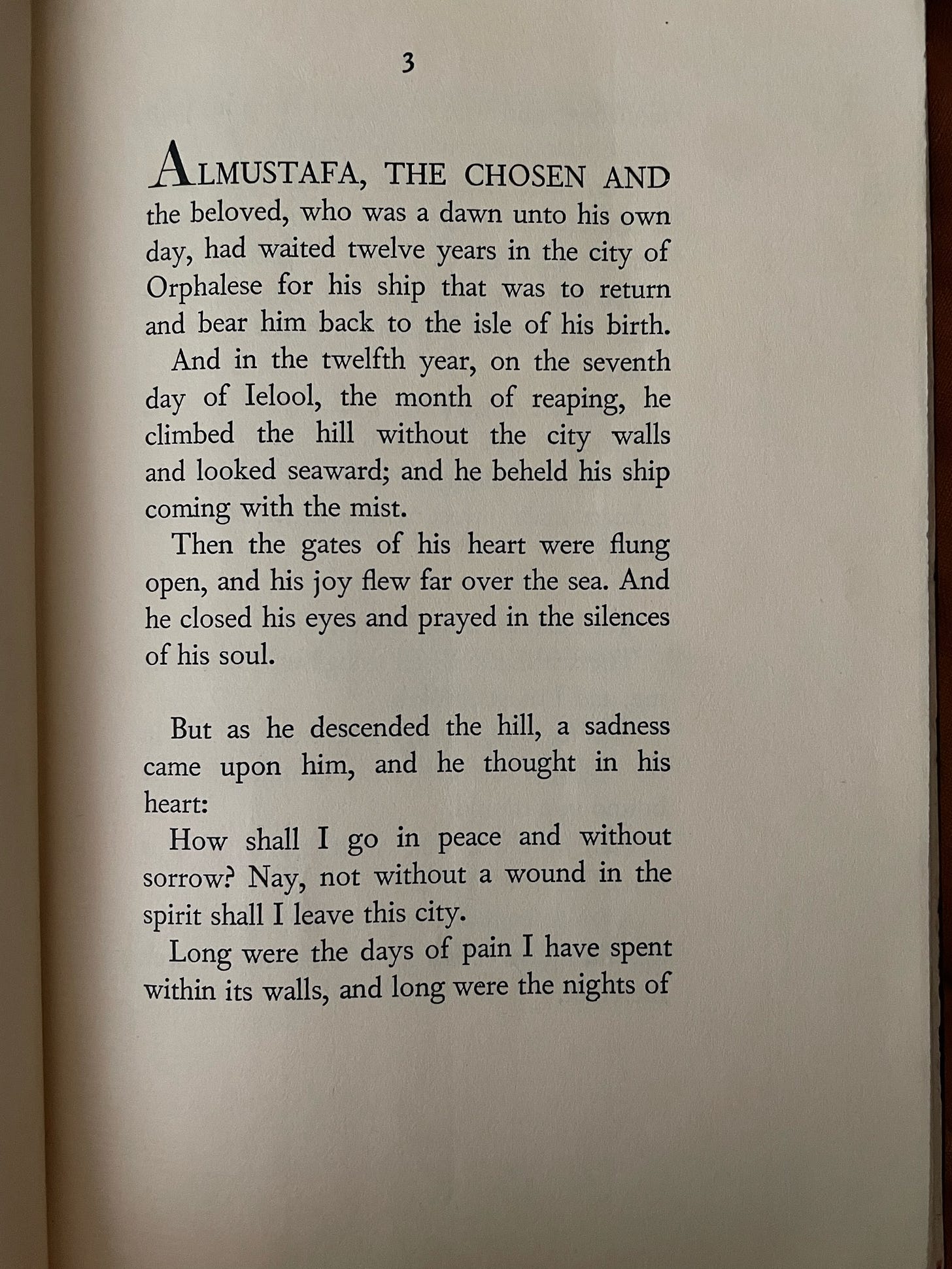
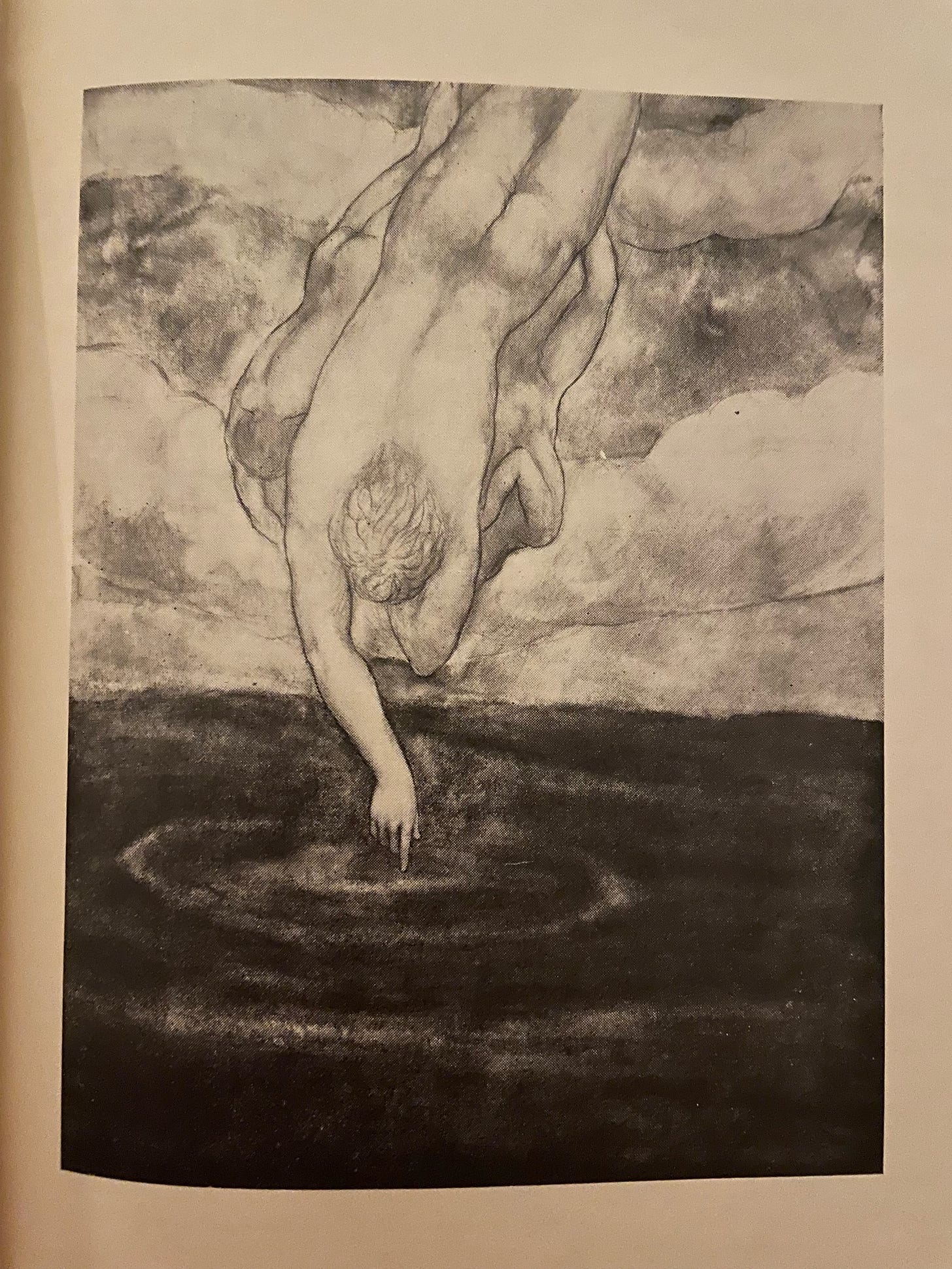
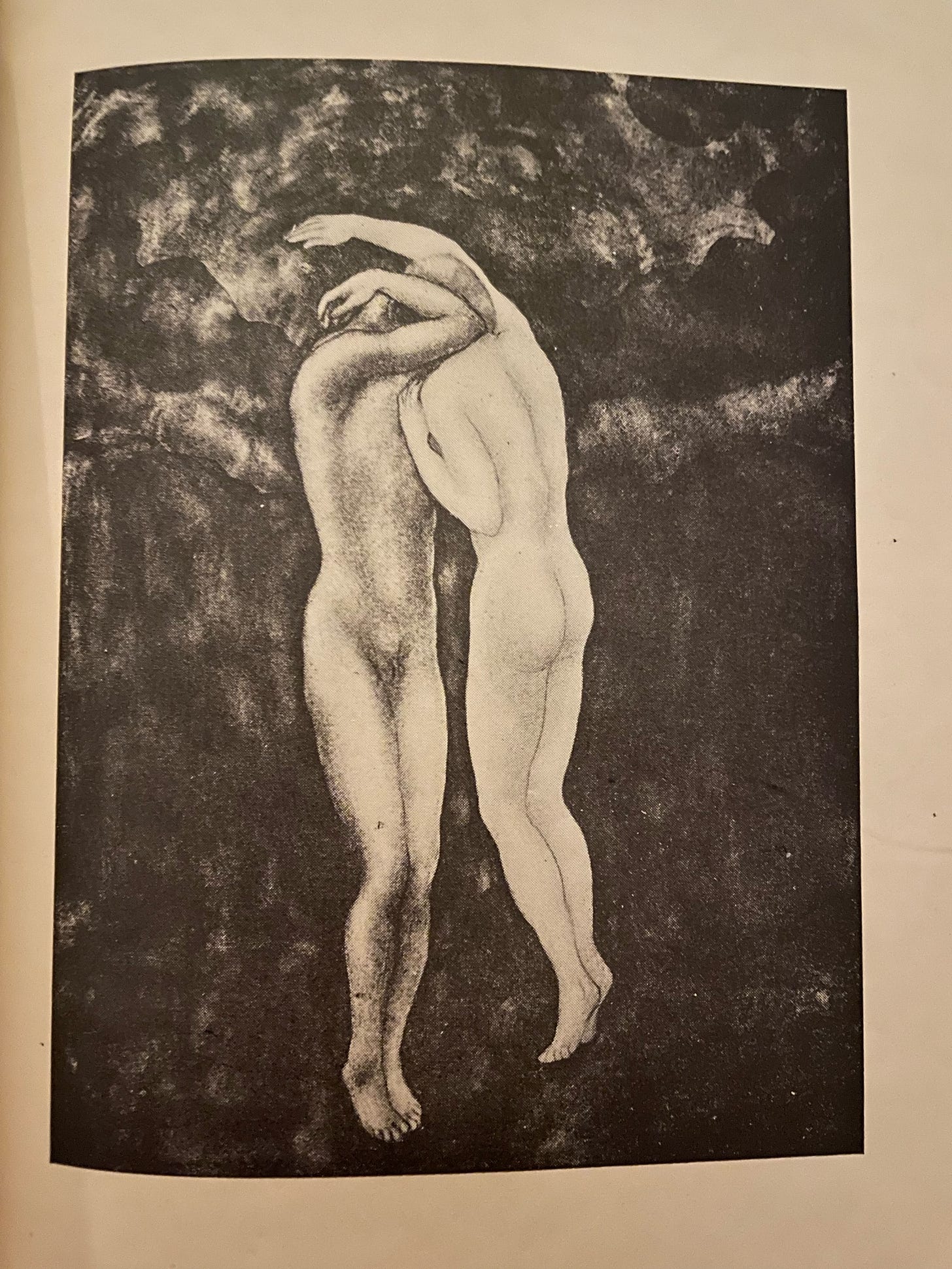
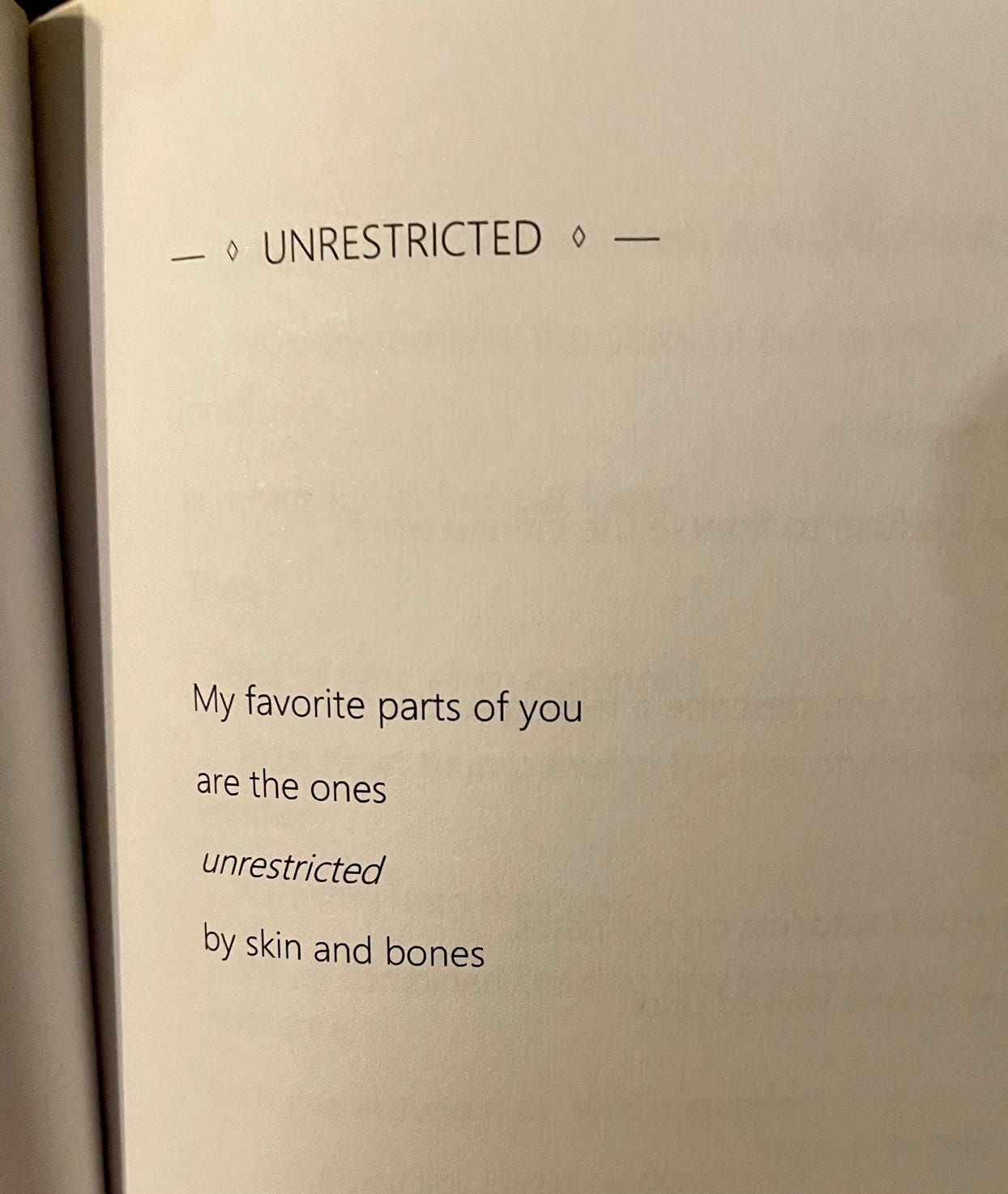
You are brilliant and I love you so much. I'm forwarding this to some sages I know.